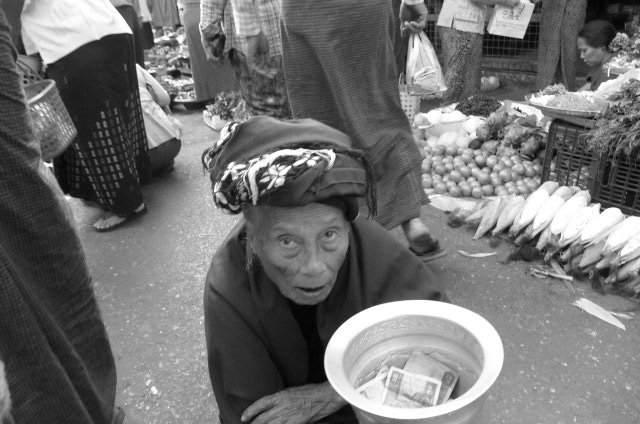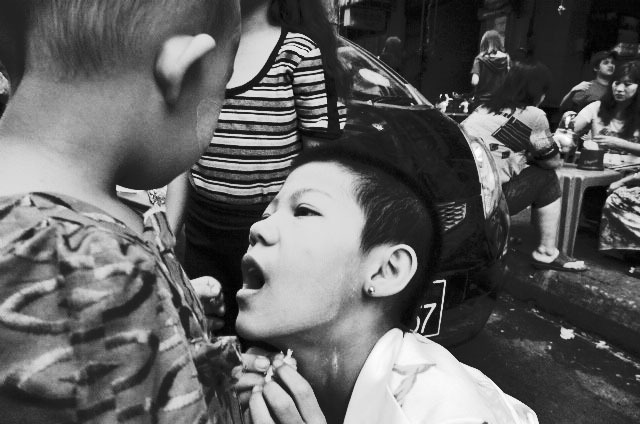Yangon, Burma
 07.30.2018 |
07.30.2018 |  tm leonard
tm leonard The English facilitating opportunity in Yangon met his needs for five months. He and four other teachers were downsized by Mr. Money, CEO when he lost a building lease.
Let’s have some language fun in Utopia. Open your head heart mouth. Dream big draw big.
Create a new photo book, entitled Street 21 documenting Yangon, Myanmar.
Until nationalism in 1962 English was taught in schools.
Bye-bye British. Now it’s Burmese. Many people here speak the language of noble barbarians. Hello, what’s your country? God bless you, said a smiling man.
Everyone is friendly gentle and kind. Buddhist nature.
Myanmar has seven states and 135 ethnic groups. 55-60 million.

His Yangon neighborhood reminded him of China in the 90’s. Tight narrow dwellings.
He lived 114 steps up from ground Zero. He salutes sunrise. Crows say hello. Caw-caw, look a stranger. Their wing music is soft. Feathers glide through air with the greatest of ease.
Train whistles, click-clack music street sellers sing dawn food wares, bird songs.
Two yellow bamboos, one green bamboo and a red and white flowering thick-stalked plant in green and blue containers absorb balcony sun.
Joy is growing, nurturing a small garden. The weather is cool and mild through March - then big heat for three months followed by the rainy season. Sky tears.
He takes a taxi to work/home for $1. Horrendous traffic jams. I’ll race you 10’. Ok. Creep and stop. No motorcycles are a quiet blessing. Banned after an assignation attempt.
Get to the verb. I am a camera. Hunt, freeze, shoot.
Have ink will travel.
Bleed words.
It’s not about you.
It’s ten claws scratching at twenty-six letters.
This is a letter.

He traverses 114 steps, open the large lock on the sliding gate, passes through life, slides it locks it and walks down the street passing men frying dough, tea drinkers eating noodles, women selling fruit and veggies from bamboo baskets, people staring at cheap phones asking relatives are you still alive, where are you, when are you coming home, I miss you as he passes through a narrow alley with 3-4 story apartments, balconies spilling flowers, grateful sliding gates, passive dogs and pedestrians.
The path leads past wooden and bamboo homes where people cook outside corrugated bamboo shacks, bath from large cisterns, kids play, women cook/sell street eats, people chat, walking to the large local market overflowing with colorful nutrition. Fresh cut flowers in 1001 varieties for sale are ubiquitous. Home décor. Bouquets say hello. Women wear sweet smelling white flowers in their hair.
He reaches the small local train station.
Red brick, oval shaped entrance. Barred ticket window. Friendly man helps negotiate a ticket into city center. 200 Khat (20¢).
Four tracks, discarded cars lie on abandoned ways. People burn trash along tracks. Bamboo shacks. PSP mansions. Women dry sardines on pavement.
Waiting seats are iron-rails glued to cement pedestals. Men spit out red betel nut juice. Betel sellers are everywhere. Big business. Cheap buzz. Cancer of the mouth.
Push and shove to get on. Get going. Get real. Get out.
Get is the joker word in English.
The southbound engine pulls six yellow and brown cars packed with humans going to work, school and town.
Women balance watermelon slices on heads selling red juicy slices, men hawk DEMOCRACY newspapers and boys proffer water.
Down the line they jump off and grab a train going north. The majority of passengers stare at cell phones. The real world is boring enough as it is.
Traveler hits the bricks doing documentary street photography, exploring narrow streets filled with Indians, Bangladeshis, Pakistanis, Chinese, Burmese, street stall food smells, buyers and sellers, meat, fruits, vegetables, hard survival jingle-jangle life. Pulsating vibrancy.
He feels alive here.

Every week he visits a new barber in town for a head shave. Indian. Chinese. Burmese. Travel taught him to trust a man holding a straight razor against his throat.
Sitting meditation.
This is the perfect place to gather raw poetics about the human condition.
A lapidary man has an extensive operation cutting/polishing stones from a jade quarry. He explains qualities and examples of mounted ruby, blue sapphire and jade pieces. A huge business considering northern slave mines, Chinese demand and international markets.
+
Traveler smells like garlic after preparing his lunch of sardines, broccoli, spinach, pasta, carrots, tomato, avocado, garnished with oregano, curry spice, saffron and olive oil.
Teak chopsticks will travel.
He eats in the upstairs staff dining area with female Customer Service Officers. They bring rice, small bags of spicy add-on juices and portions of pork or fish in shiny round aluminum stacked containers. Mommy makes my lunch, they murmur.
They shovel it in with aluminum spoons. They talk with their mouths full. Traveler shares veggies. Hot green Nara tea is delicious. Leaves float on the surface.
One CSO girl said, the CEO is mean and selfish. Yes, said traveler.
The other native teachers devour fast food from the hamburger joint at the nearby shopping center while sitting at their desks staring at computers or yakking. Exciting.
Teachers fly to Bangkok every seventy days on a visa run. HR provides holding company business documents for re-entry into the gravitational field. Forms, a smiling photo and a clean $50. Old money is not accepted. No creased, folded currency. So it goes.
Longyi is the traditional sarong-like apparel for men. He discovered a fine silk cotton blend in Mandalay at a weaving village way back when. Ventilation.
Needle leads thread. Threads lead a conversation.






Reader Comments